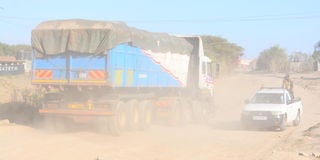'Abandoned' Kitengela-Rongai by-pass a pain to locals, scares away investors

Vehicles along the dusty Kitengela-Ong'ata Rongai by-pass.
On a normal day, heavy dust spirals up, covering dozens of trucks transporting building materials and raw materials for making cement on the Kitengela-Ongata Rongai road.
Huge potholes and heavy dust characterise the neglected proposed bypass that is perceived by locals as their economic gem. The road has stalled for almost a decade.
Apart from the road connecting Kitengela town in Kajiado East sub-county and Ongata Rongai town in Kajiado North sub-county, it also connects to dozens of quarries in Sholinke and Nkurunka villages.
However, over the years, locals have been subjected to untold suffering after investors began relocating. Owners of rental houses and transporters are counting losses.
The 30-kilometre road runs parallel to the Nairobi National Park borderline and Standard Gauge Railway line (Sgr) to the Twala neighbourhood. It further snakes past the African Nazarene University Sgr Ongata Rongai station, extending to Limpa and finally connecting to Magadi Road.
On Saturday, locals told Nation.Africa that the road was last rehabilitated by Kenya Urban Rural Roads, (Kura) in 2014. Despite numerous protests by transporters and locals, no major rehabilitation has taken place.
Nation has established that Kura had spent Sh232 million. Also, the tarmacking of the road has been advertised by Kenya Rural Roads Authority (Kerra) and Kura in the last ten years before hitting a snag. The road is classified as road ‘C 'classified under Kerra.
At least 400 trucks either ferry quarry stones to the local construction industry or pozzolana (volcanic ash used for making cement) to Athi River cement processors daily.
Bad road
"Our trucks bear the biggest brunt of the bad road. Hardly a truck can go for more than a week without a breakdown. Both the national and county governments are minting billions annually in revenue yet they are reluctant to repair the road,” said Mr Simon Mwania, a driver whose truck broke down on the road on Saturday.
Most tenants have moved out of rental houses along the road in Kitengela town. Homeowners have also relocated elsewhere.
Ms Nancy Njeri has blamed Kura for the failure to tarmac the road. She told Nation.Africa she has been forced to hang on despite the dust and noise from trucks.
"You cannot wash clothes and hang them outside to dry because of dust. This exposes us to respiratory diseases,” she said
No matatus ply this road and residents living along the bad road rely on the trucks to travel to Kitengela or Ongata Rongai towns.
To the locals, the bad road has seen the prices of land stagnate for years. Some investors have recently relocated to the Lukenya region in Machakos County.
"The proximity of our region to Nairobi gives us a head start in property value but the bad road has been a major deterrent. The land value appreciation is minimal. Investors are relocating in droves," said Mr Harvester Kisemei.
The major economic activity in Nkurunka and Sholinke residents is quarrying. The area has some of the largest pozzolana quarries.
"Most locals survive from quarries. We are forced to temporarily close our quarries during the rainy season. The brisk stones and pozzolana businesses have been affected by the bad road,” said Mr Peter Morindat.
Satellite towns
Former Kajiado Senator Peter Mositet blamed the national government for the poor state of the road.
Eng. Mositet said the road is a major facet for economic and hospitality boost owing to its proximity to Nairobi National Park and Nairobi City.
"Tarmacking of this road is long overdue since it will spur growth in the two satellite towns within the Nairobi metropolitan,” he said.
Kajiado East MP Kakuta Mai Mai said he was pushing the Kenya Rural Roads Authority (Kerra) to secure funds to tarmac the road in phases.
"We are talking with Kerra about the tarmacking of the road. This road is the economic backbone of the urban population of my constituency,” he said.
The road is significant to the Kajiado County government considering that many landowners along the road have turned part of their vast land into quarries. The County government charges quarry operators Sh100,000 annually. The trucks also pay a cess fee for each trip.





